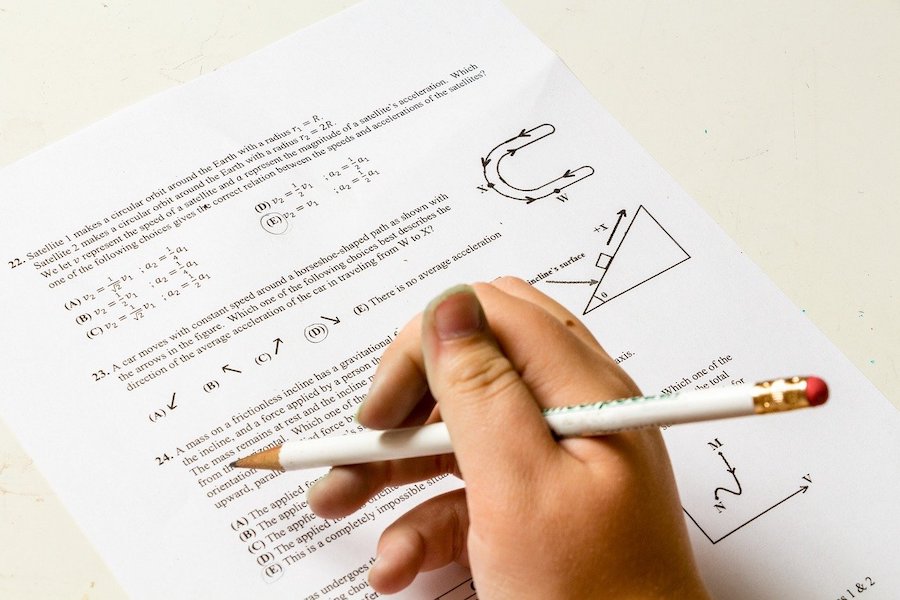Wearing a watch in an exam has its advantages, but there is news of examinations banning watches. So, can you wear a watch in an exam?
You can and should wear watches in exams as it helps pace yourself and ensure you have enough time to finish the questions. There might be no clocks in the exam hall, so a watch will be beneficial. Some people feel weird without watches, so wearing one for exams feels more comfortable.

In this article, we will investigate why people wear and do not wear a watch to exams. If you decide to wear one for exams, we will also discuss what kind of watches are suitable for examinations.
We then answer several questions people tend to ask about watches and examinations as well.
Why You Should Wear A Watch In An Exam
You should wear a watch during an exam because it helps keep you updated with time and ensure you are pacing yourself enough to complete the questions. A watch helps you to feel more comfortable if you are the kind that feels weird without wearing a watch.
Keeps you updated with time. Exam halls are usually well prepared, but some might not have a clock. If they do, at times, the clock might not be large enough for you to read the time well enough.
Having a watch will solve the issue, as all you need to do is to take the watch off, place it in front of you on your desk, and you can use it to tell time anytime you want throughout the exam.
Pacing yourself. One of the biggest fears of examination candidates is that they will run out of time to finish their exam script.
This can happen when candidates are too careful with the questions. They take too much time or spend too much time deliberating on questions they might not know. It eats away time to work on other sections.
You can ensure that you are pacing yourself well to finish the exam paper with a watch. If section A suggests you finish in 20 minutes, you should ignore those unanswered questions and move on to the next section once you reach that time.
Once you finish everything, you can then come back to revisit the unanswered questions.
Naked Wrist Feels Wierd. This may sound odd, but some people are so used to wearing a watch they feel ‘naked and cold’ on the wrist without one. Some also mentioned how they feel uneasy and uncomfortable without the weight on their wrist.
Examinations are a mentally stressful thing to face. If wearing a watch helps bring in a bit of comfort to help you face examinations better, you should just strap up a watch and enter the exam hall with it.
Why You Should Not Wear A Watch In An Exam
You should not wear watches into examinations as some examinations ban watches for fear of cheating. Watch alarms beeping can also be distracting to candidates. A large clock is often displayed in exam halls to help candidates tell time.
Some exams ban watches. Different examinations have different policies when it comes to watches. Often the concerns about watches are how watches could help candidates to cheat.
For example, candidates could hide notes between the caseback and skin or around the watch strap and the skin. Candidates can also write something on the wrist and use the watch to cover it.
The proliferation of smartwatches also made it harder to prevent cheating. Smartwatches are getting more and more advanced to the point that they can be used as smartphones. Many smartwatches look more like a traditional analog watch, such as Fossil’s hybrid watches.
ALSO READ: Fossil Watch Review
Therefore it is no surprise that in Britain, no candidates are allowed to wear wristwatches of any kind when they sit for their GCSE and A-Level Examinations. The British A-Level would roughly be equivalent to a AP (Advanced Placement) in the US.
The trend is picking up, and more learning institutions would follow up and ban watches.
Alarms may be distracting. During examinations, candidates are very focused on their answers and attempt to do their best to complete the task in a limited time.
Such intense focus can easily be distracted by a sudden beeping of watch alarms, either your watch or other candidates. It does not help that exam halls are usually so quiet you can hear a pin drop.
It might be hard to regain focus when you have been distracted. With exam halls having many candidates, do not be surprised to hear multiple alarms beep at different times during the exam.
Therefore, you might not want to wear a watch in exam halls, especially if your watch has an alarm, to avoid distracting yourself or other candidates.
There is an exam clock. In many examinations, the invigilators are often prudent enough to prepare a clock in the exam hall to help candidates tell time as they work on their scripts. They would also be careful to ensure that the clock is large enough for candidates to see.
Sometimes, in situations where there are no clocks, the invigilators may write on the whiteboard in front of the hall the elapsed time. This can also be used to help you tell time.
With these clocks and notifications, you probably would not need to wear a watch in the exam hall.

What Type Of Watches Best Suit Exams?
A watch suitable for exams should have no alarm, as it may be distracting. The watch dial should be big to make it easy to tell time. Avoid metal bracelets as they might make noise, and the watch should be easy to put on and take off as you may need to do so repeatedly during exams.
No Alarm. A watch without an alarm is just basic courtesy to yourself and other candidates. As much as we may remind ourselves to turn off the alarm before starting the exam, we might forget due to the stress of preparing for the exam.
Larger dial. This might not be too important, but we might be focused during exams and may only occasionally take a quick look at our watch. If the watch has a larger dial, it might help you tell time faster. You might just save those crucial seconds to focus on your exam script.
Quiet. Your hands may be moving a lot during examinations. Your dominant hand may be busy writing. Your non-dominant hand may be moving about keeping your papers steady or helping to flip papers.
ALSO READ: On What Hand Should We Wear Our Watches?
If your watch has a metal bracelet, it may make unnecessary noise, for example, scraping against the table or jangling about when you move your hands. Perhaps non-metallic straps such as leather, silicone, or nylon might be better.
Easy to take off and put on. Some exam regulations may require you to take off your watch and place it on the table to prevent cheating. You may also have that preference so that you can tell time quickly.
You may be doing the action of taking off and putting on watches repeatedly throughout your examinations. That means if your watch is easy to take off and put on, it may be helpful.
A velcro watch strap should be the easiest, although traditional pic and buckle style fastening should be ok. Nato or Zulu straps may not be ideal, as they take a bit more steps to take off and put on.
Are Watches Banned In Exams?
Watches are currently not banned in all exams but are increasingly so. Candidates are now banned from wearing wristwatches for GCSE or A-Level exams in Britain. The concern is about potential cheating, and that watches may not be needed when exam halls have a clock.
More and more learning institutions are developing policies on watches for examination, due to concerns about cheating. It doesn’t help that it becomes easier to cheat and pass information to candidates with the rise of smartwatches.
Some examinations have policies that only analog watches are allowed. Some will require candidates to take off their watch and place it on the table throughout the session. Some outright ban any form of wristwatches, for example, in Britain.
Why Do You Have To Take Your Watch Off In Exams?
Candidates must take off watches in exams to address issues such as cheating. Taking watches off also allows invigilators to easily see what is on the watch face to avoid cheating.
Watches can easily facilitate cheating in examinations. Candidates could be hiding notes between the watch caseback and their skin, and some are also known to write notes on the wrist and cover them up with their watch.
Watches could also be used for candidates to collaborate and share answers with each other. For example, in multiple-choice questions, candidates could agree on a code and use it to share answers, such as 3 o’clock means ‘A,’ 4 o’clock means ‘B,’ etc.

